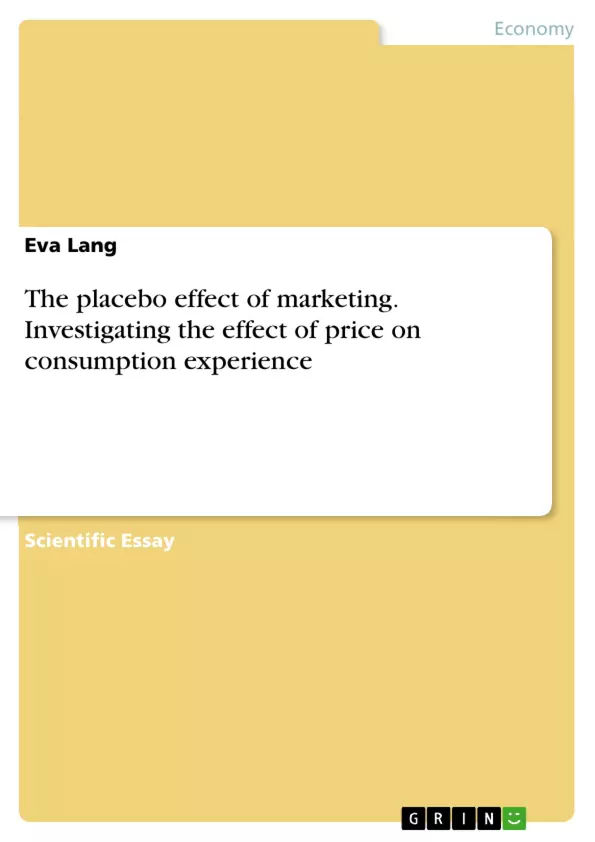Several studies investigated how marketing actions can affect consumers’ product perception and thereby evoke a placebo effect. Notably, Irmak et al. (2005) were able to trigger identical objective body reactions for a product and its placebo. This suggests that manipulating marketing stimuli can not only alter subjective perceptions, but also objective physical product responses. This is in line with the inconsistent quality perceptions of NBs and PLs and leads to this paper’s research problem: What are the subconscious processes that explain how price impacts subjective taste experiences?
Taste experiences are closely linked to quality assessments which are both crucial for purchase decisions, thereby impacting a company’s financial outcomes. It is thus relevant for marketers to understand how consumers derive their evaluations and how external attributes can affect them in a placebo-like manner. For this reason, the research question will be accompanied by a review of how neuroscientific approaches can add to the understanding of the placebo effect and how it can be leveraged by marketers.
Table of Contents
- Introduction
- Theoretical Review
- Neuroscientific Contributions
- Conclusions and Limitations
- References
- Appendix
Objectives and Key Themes
This paper investigates the placebo effect of marketing, specifically the influence of price on consumption experience. It explores how price cues can impact subjective taste experiences and examines the underlying subconscious processes involved. The goal is to understand how consumers derive their product evaluations and how external attributes can affect them in a placebo-like manner, providing valuable insights for marketers.
- The impact of price on subjective taste experiences
- The role of expectations and learning in shaping consumer perceptions
- The limitations of traditional models in explaining the placebo effect
- The potential of neuroscientific approaches to provide a deeper understanding of the placebo effect
- The implications of these findings for marketing strategies
Chapter Summaries
The introduction establishes the context of the study by highlighting the prevalence of private label (PL) products and their often-contradictory quality perceptions compared to national brands (NBs). It introduces the concept of the placebo effect in marketing and its connection to consumer beliefs and expectations.
The theoretical review delves into standard economic theories and their assumption of utility maximization. It explores the price-quality relationship and how consumers rely on observable cues, such as price, to infer product quality. Two key models, expectancy theory and classical conditioning, are presented to explain the placebo effect in the medical domain. The combined framework integrates these models and emphasizes the mediating role of expectations in shaping consumer experiences.
Keywords
Placebo effect, marketing, price, consumption experience, taste perception, expectations, learning, neuroscientific approaches, consumer behavior, brand perception, private label, national brand, quality assessment.
Frequently Asked Questions
What is the "placebo effect of marketing"?
It refers to the phenomenon where marketing stimuli, such as price, can alter a consumer's subjective perception and even objective physical reactions to a product, similar to a medical placebo.
How does price influence the taste experience?
Consumers often subconsciously associate higher prices with higher quality. This expectation can trigger subconscious processes that actually make the product taste better to the consumer.
Which psychological models explain this marketing placebo effect?
The paper discusses expectancy theory (where beliefs shape outcomes) and classical conditioning (where past experiences link price cues to quality) as primary explanations.
What is the role of neuroscience in this research?
Neuroscientific approaches help identify the brain activities and subconscious processes that traditional economic models cannot fully explain, providing a deeper understanding of consumer evaluation.
Why are private labels (PL) compared to national brands (NB)?
The study highlights the inconsistent quality perceptions between these two, showing how brand name and price can override objective product quality in the consumer's mind.
- Quote paper
- Eva Lang (Author), 2020, The placebo effect of marketing. Investigating the effect of price on consumption experience, Munich, GRIN Verlag, https://www.grin.com/document/1268809



